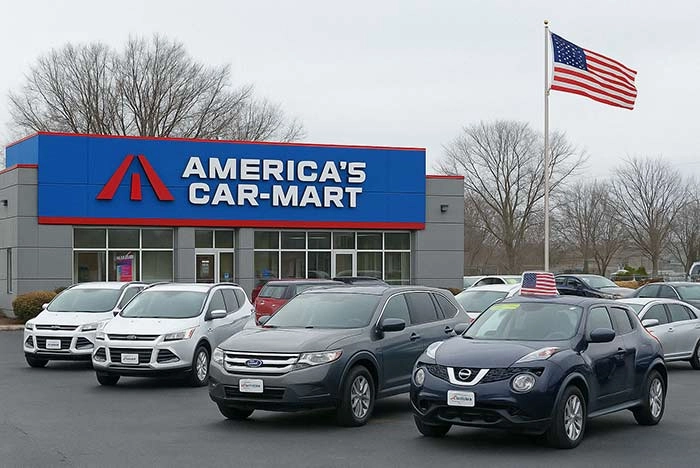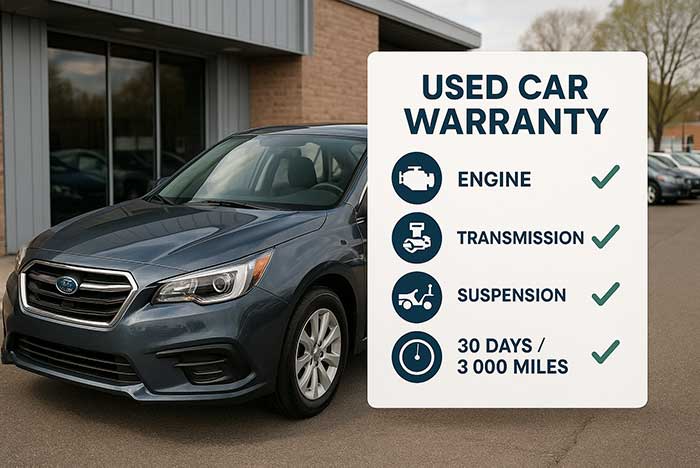
Best Websites to Buy Used Cars in the USA – Top Online Marketplaces
Top 10 Websites to Buy Used Cars in USA
Posted by admin on October 7, 2024
Here are the best websites to buy used cars in USA, offering insights to what makes each website stand out. Whether you prioritize prize, vehicle history, or financing options, the change is that you will find it out in one of these platforms. The goal of us, is to help you find the car-buying site so that you can confidently make your next purchase without the headaches or hidden surprises.
List of TOP Websites to Buy Used Cars in USA.
| Website | Summary |
|---|---|
| Autotrader | Extensive listings (3M+) with advanced search filters and resources for financing and trade-ins. |
| Cars.com | Over 4 million listings, expert reviews, comparisons, and CARFAX vehicle history reports. |
| CarGurus | User-friendly interface with a large inventory and proprietary rating system for listings. |
| CarMax | Large inventory with both online and in-person purchasing options; straightforward selling process. |
| Carvana | Focuses on online purchases with home delivery; convenient for selling cars as well. |
| Craigslist | Popular for local transactions; primarily private party sales but requires caution against scams. |
| Facebook Marketplace | Growing platform for local listings; users should be vigilant about potential scams. |
| AutoTempest | Aggregator that pulls listings from various sites, providing a wide range of options in one search. |
| eBay Motors | Good for unique or classic cars, offering bidding or direct purchase options. |
| Edmunds | Detailed information on pricing and reviews, aiding in research before buying. |
1. Autotrader
The website Autotrader is founded in 1997, and is one of the largest and most trusted website for buying and selling used cars in USA. It is used by wide range or audience, including individual buyers, dealerships, and private sellers. Autotrader is best for users who want a comprehensive selection of vehicles, along with robust search tools to filter listings based on detailed criteria.
Pros of AutoTrader
- Huge Inventory: Offers a massive selection of cars from both dealers and private sellers.
- Advanced Search Filters: Allows detailed searches by make, model, price, mileage, and more.
- Vehicle History Reports: Many listings include CARFAX reports for added transparency.
Const of AutoTrader
- High Dealer Fees: Listings from dealerships may come with higher fees than private sellers.
- Can Be Overwhelming: The large number of options may be daunting for first-time buyers.
- Limited Negotiation: Some dealer listings may limit room for price negotiation.
2. Cars.com
Cars.com was launched in 1998 and become popular website for trading used or new vehicles. It’s widely used by both individual buyers and dealerships, making it a trusted source for car shoppers. The website has user-friendly interface and in-depth reviews, it is ideal for those who want to research before making a purchase.
Pros of Cars.com
- Comprehensive Vehicle Listings: Includes a wide range of listings from both private sellers and dealerships.
- Expert Reviews and Buyer Guides: Offers detailed reviews and comparisons to help buyers make informed decisions.
- Price Comparison Tools: Helps users compare prices with similar listings to gauge whether they’re getting a good deal
Cons of Cars.com
- Limited Private Seller Listings: Focuses more on dealership listings, which may limit options for private sales.
- Potential for Dealership Fees: Some vehicles may come with additional dealer fees.
- Ads and Sponsored Listings: Can sometimes make navigating through organic listings difficult.
3. CarGurus
CarGurus was founded in 2006 and quickly become one of the most popular websites for buying and selling second had vehicle in USA. CarGurus rely heavily on data-driven approach, they help the users to find the best deals by analyzing prices across available listings. It’s best for buyers looking for transparent pricing and market insights.
Pros of CarGurus
- Price Analysis Tools: Uses data to rank listings based on value (e.g., “Great Deal,” “Fair Deal”), making it easy to spot good deals.
- Dealer and Private Listings: Offers a mix of listings from both dealerships and private sellers.
- Market Transparency: Provides insights into how long a car has been on the market and whether the price has dropped.
Cons of CarGurus
- Dealer-Centric Listings: Most listings come from dealerships, which may reduce the number of private seller options.
- Potential Hidden Fees: Some dealer listings may not clearly disclose additional fees.
- Ads and Pop-ups: Can disrupt the browsing experience at times.
4. CarMax
CarMax was launched at 1993, and it is one of the largest used car retailer in the USA. The website is known for its no-haggle pricing and no stress buying experience. It’s best suited for buyers who want a straightforward and transparent purchasing process, with the added security of warranties and vehicle inspections.
Pros of CarMax
- No-Haggle Pricing: Offers transparent, fixed prices, so there’s no need to negotiate.
- Thorough Inspections: Every vehicle undergoes a 125+ point inspection to ensure quality.
- Generous Return Policy: Offers a 30-day/1,500-mile money-back guarantee for added peace of mind.
Cons of CarMax
- Higher Prices: The no-haggle model may result in higher prices compared to private sellers or other platforms.
- Limited Private Sales: Primarily focused on dealership sales, with no private seller options.
- Service Fees: Potential for additional fees, especially with delivery services.
5. Carvana
Founded in 2012, Carvana revolutionized the used car buying experience by offering an entirely online process, including home delivery and unique car vending machines. It’s ideal for buyers who prefer convenience, a digital experience, and want to avoid traditional dealerships.
Pros of Carvana
- Fully Online Experience: Allows users to browse, buy, and finance cars online, with home delivery or pickup options.
- 7-Day Return Policy: Offers a 7-day test-own period, giving buyers peace of mind.
- No-Haggle Pricing: Fixed, transparent pricing simplifies the buying process.
Cons of Carvana
- Limited Negotiation: No room for price negotiation due to fixed pricing.
- Delivery Fees: Depending on location, delivery may come with additional costs.
- Limited Inventory for Certain Locations: Availability can vary by region.
6. Craigslist
Craigslist was founded at 1995, the platform is well known website that allow to users to sell and buy carious of items, and used cars. It is more like Facebook Market place. The website is best suited for people looking for a deal, and like to negotiate one the price. The direct transactions with private sellers, often at lower prices, though it comes with less buyer protection than dealership or certified platforms.
Pros of Craigslist
- Direct Private Sales: Often offers lower prices compared to dealer listings.
- Local Listings: Allows buyers to find cars in their immediate area, facilitating quick transactions.
- No Listing Fees for Buyers: Free to browse and contact sellers, with no extra costs for buyers.
Cons of Craigslist
- Lack of Buyer Protection: No guarantees or inspections, so buyers must be cautious.
- Scams or Fraud: Higher risk of fraudulent listings, requiring extra diligence from buyers.
- Limited Search Filters: Fewer tools to refine searches compared to more specialized car-buying platforms.
7. Facebook Marketplace
Launched in 2016, Facebook Marketplace is a popular platform for buying and selling items locally, including used cars. It’s widely used due to its integration with Facebook profiles, making it easier for buyers to view seller information and communicate directly. Facebook Marketplace is ideal for users looking for local private car sales with a personal touch.
Pros of Facebook Marketplace
- Local Deals: Focuses on local listings, making it easy to find used cars nearby.
- Direct Communication: Allows for easy messaging with sellers through Facebook Messenger.
- Seller Transparency: Buyer can view the seller’s profile for additional trust and credibility.
Cons of Facebook Marketplace
- No Buyer Protection: No guarantees, warranties, or vetting for vehicle listings.
- Risk of Scams: Like other private sale platforms, there’s a risk of fraudulent listings.
- Limited Search Features: Fewer advanced filters compared to dedicated car-selling platforms.
8. AutoTempest
AutoTempest founded in 2007, and it is a meta-search engine that aggregates listing from various platforms for vehicle trading like eBay Motors, Craigslist, and Cars.com, among others. It’s best suited for buyers who want to search multiple websites at once to compare deals and maximize their options.
Pros of AutoTempest
- Aggregates Multiple Platforms: Searches listings from several major car websites, saving time for buyers.
- Wide Range of Listings: Includes both dealership and private seller options from various sources.
- Price Comparisons: Makes it easy to compare prices across different platforms for the same model.
Const of AutoTempest
- No Direct Listings: AutoTempest doesn’t host its own listings, so buyers are redirected to external sites.
- Varied Listing Quality: The quality and detail of listings depend on the source platform.
- No Buyer Protections: Since it’s a search engine, protections or guarantees depend on the original platform.
9. eBay Motors
eBay Motors, a division of eBay founded in 2000, is a popular platform for buying and selling used cars, motorcycles, and parts. It’s ideal for buyers looking for a wide variety of vehicles, including rare or classic models, with the ability to bid in auctions or buy at fixed prices.
Pros of eBay Motors
- Auction and Buy-It-Now Options: Offers flexibility with both auctions and fixed-price listings.
- Vehicle Protection Programs: Provides certain buyer protections, including vehicle history reports and purchase guarantees.
- Wide Range of Vehicles: Includes rare, classic, and unique cars not often found on other platforms.
Cons of eBay Motors
- Potential for Bidding Wars: Auctions can drive up prices, leading to higher-than-expected costs.
- Shipping Costs: Buyers may face high shipping fees for non-local purchases.
- Varied Seller Reliability: Buying from individual sellers can be risky without proper vetting.
10. Edmunds
Founded in 1966, Edmunds started as a car-buying guide and has evolved into a comprehensive online resource for new and used car buyers. Known for its expert reviews and detailed car data, Edmunds is ideal for users looking for a mix of listings and in-depth vehicle research. It offers tools to compare cars, check market value, and read expert opinions before making a purchase.
Pros of Edmunds
- Expert Reviews and Guides: Provides comprehensive reviews, car ratings, and buyer guides to help users make informed decisions.
- Price Analysis Tools: Helps users see fair market values and compare prices.
- Trusted Reputation: Established as a reliable source for automotive information.
Const of Edmunds
- Smaller Inventory: Compared to larger platforms, the number of used car listings can be limited.
- Dealership Focus: Primarily features cars from dealerships, with fewer private seller listings.
- Limited Private Sale Options: Users looking for private transactions may need to consider other platforms.


